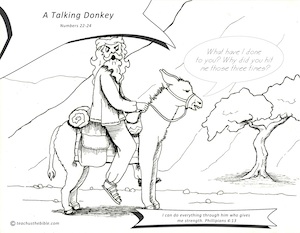22. A Talking Donkey
Numbers 22-24Background Scripture (read 2-3 times during the week)
Story Summary
Background:
Balaam was a magician, a false prophet. He was not one of God's chosen people (Israelites), nor was he a believer. He put curses on people for money. He was representing God, but in reality was using the Lord's name in vain. He was pretending to represent the Lord. Any good words that came out of Balaam's mouth were placed there directly by God. Balaam's motivations were not pure. In Numbers 25, we see the Israelites committing sexual sins with the Midianite woman and turning away from God. Numbers 31 reveals this as Balaam's idea to turn the Israelites away from God and cause them to self destruct, since his first strategy to curse them was not successful. (Also see 2 Peter 2:15 and Revelation 2:14)
Story:
Balak, the king of Moab, had a problem. The Israelites were being led into the promised land by God and were commanded by God to destroy all of the current residents of that land. They had just finished their task of wiping out the Amorites and the Moabites were next.
The people of Moab were terrified because there were so many Israelites. In fact, Moab was filled with panic because of the people of Israel. Numbers 22:3.
Balak was the king of Moab, at the time. He was going to pay Balaam to put a curse on the Israelites. He asked for Balaam to come meet him. Balaam rode a donkey to go meet Balak. An angel of the Lord appeared to the donkey on his way, 3 times. Each time the donkey saw the angel and tried to turn away. He knew the Lord was against Balak. Each time the donkey turned away, Balaam beat the donkey to try to keep him moving forward. After the third time, the Lord opened the donkey's mouth and he talked to Balaam. It said to Balaam, “What have I done to you? Why did you hit me those three times?” Numbers 22:28.
At that same time, God made Balaam see the angel. It appeared Balaam was repentant, but his heart was still opposed to the Israelites.
Even though Balaam still wanted to curse the Israelites. God would not let him. Instead, he made him bless the Israelites.
The lesson for our children is to teach them that God's plans will not be thwarted. The silly donkey knew better than Balaam to listen to God. The author uses satire to bring about this point. Another key lesson is that God chose the Israelites to be his people. We see throughout the Old Testament that God protected the Israelites and this is one of those stories.
1. Warm Up get your kids talking and engaged
Have you ever seen a talking animal? (Consider using Talking Animals Reinforcement activity)
In our story today, we are going to learn about the second time in the Bible that an animal spoke. Do you remember the first time? (serpent speaking to Adam and Eve)
Bonus points for bringing a live donkey to class...
2. Teach the Story teach a holistic story
Read story from a Children's storybook Bible for younger children.
For older children, read story straight from the Bible or tell the story yourself.
3. Bible Mastery give them basic Bible skills
Scripture for Kids to Read Aloud Numbers 22:5-6; 22:21-33; 23:7-12
4. Comprehension Questions make sure they understand the story
First, ask the children if they have any questions about the story. What to do if you don't know the answer?
- Who was the king of Moab?
- Balak
- Why did Balak want Balaam to curse the Israelites?
- He was afraid that they were going to destroy the Moabites
- What animal did Balaam ride?
- A donkey
- Why did the donkey go off the road?
- It saw an angel on the road
- What did Balaam do when the donkey went off the road
- He beat the donkey to get it back on the road
- How many times did the donkey see the angel?
- 3 times
- What happened after Balaam beat the donkey the 3rd time?
- The donkey talked to Balaam and asked him why he was hitting him, Balaam saw the angel too
- Did Balaam ever curse the Israelites?
- No
5. Faith Questions open up a conversation about faith and the gospel; close with prayer
- In this story, we learn that God is a faithful God who keeps his promises. He made a covenant with Israel, and he kept it.
- Did you know that if you are one of God's children, he will never break his promises to you? What are we promised as children of God?
6. Memory Verse hide God's Word in their heart
Pin the Tail on the Donkey
- Print out donkey picture and assemble
- Make a tail out of strands of gray yarn (tape or glue one end together)
- Blindfold students, one at a time
- Have them try to pin the tail on the back of the donkey.
Talking Animals
- Have you ever seen an animal talk?
- Watch short video clips of Mr. Ed, Martha Speaks, or the donkey in Shrek
Donkey Tag
- Play freeze tag with the following adaptations:
- The person who is "it" is called the angel
- All the other students are donkeys
- When someone is tagged by the angel, they become frozen and must lay down (because the donkey laid down when it ran out of options trying to get away from the angel)
- The other donkeys (those who haven't been frozen) can unfreeze donkeys by touching them with a pretzel stick (to represent the stick Balaam used to hit the donkey)
Learning 10 commandments- commandment #5
- Teach the fifth commandment.
- When the child can tell you each commandment correctly, without assistance, they are given a bead for a bracelet.
- Keep the bracelet in the classroom and when they have learned all 10 commandments, they get to take it home.
- To help them remember the commandments, you can separate them into 2 groups for the children.
- The first four commandments are concerning our relationship with God.
- The last six are concerning our relationship with others.
Donkey Paper Bag Puppet
- Print pattern found on the web, below.
- Follow instructions to make paper bag puppet.
Donkey Masks
- Print masks found on the web, below, onto card stock.
- Color and cut out mask
- Attach string
Left, Right, Lay game
- Actions: Move left, move right and lay down
- Teacher calls out an order for the students to complete the actions (ex right, left, lay or lay, left, right).
- Students must complete action as quickly as possible.
- Student to complete actions last is out.
- Keep changing the order for the students to do the actions.
- Winner is the student left when all the other students have sat down.
Donkey facts
- show pictures of real donkeys.
- Donkeys are members of the horse family. A male donkey is called a 'jack' and a female donkey is called a 'jenny'.
- Donkeys are grazing animals, just like horses. In the wild, they mainly graze on grass. However, they also eat straw, tree leaves, bark, some flowers and brambles. Donkeys that are raised by humans are fed hay.
- Carrots are a favorite treat.
- Donkeys' ears are much longer in proportion to their size than a horse's.
- Donkeys are herd animals. They are happiest with at least one other donkey for companionship, and form very close bonds with their friends.
- The Greek word for donkey appears in the Bible 100 times
- Jesus rode a donkey into Jerusalem for the Passover (Mark 11:1-11)
Bible Drill
- Look up other verses in the Bible about donkeys.
- The Greek word for donkey appears in the Bible over 100 times.
- Genesis 22:3-5 Abraham was tested. Early the next morning Abraham got up. He put a saddle on his donkey... (v. 3)
- Genesis 24:35 Abraham's servant, speaking of Isaac. The LORD has given him sheep and cattle...and donkeys.
- Exodus 4:20 So Moses got his wife and sons. He put them on a donkey. Together they started back to Egypt.
- Isaiah 1:3 The ox knows its master. The donkey knows where its owner feeds it. But Israel does not know me. My people do not understand me.'
- Mark 11:1-11 Jesus rode a donkey into Jerusalem for the Passover
- Luke 10:34 He went to him, poured olive oil and wine on his wounds and bandaged them. Then he put the man on his own donkey. He took him to an inn and took care of him.


